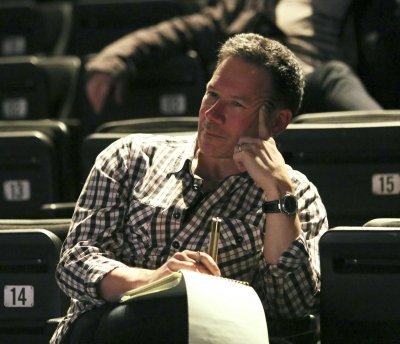The dysfunctional family drama is no stranger to the stage. From Shakespeare to Tennessee Williams, and even more recently Stephen Karam, the genre has inspired playwrights through the centuries.
In Taylor Mac ‘s Hir though, which will get its Canadian premiere later this month in Vancouver, the suburban family is turned on its head in an absurdly realistic fashion through a darkly comic exploration of PTSD, identity crises, and gender politics.

“It goes a little further than realism might,” says director Richard Wolfe. “It just takes that little extra step, but we don’t want to send it up in any way. But it’s not as highly stylized as an absurdist piece, like Ionesco; it stays in a world of realism with heightened absurdist tones.”
Pronounced “here”, and representing a gender-neutral pronoun combining “his” and “her,” Hir is the story of a dishonourably discharged Isaac, returning from the horrors of Afghanistan. His father Arnold has suffered a stroke and been rendered incapacitated; his mother Paige is finally out from under the thumb of her violently domineering husband; and his younger sibling Max is now a transgender teen out to destabilize the patriarchy.
With Arnold’s disability and Max’s coming out turning Paige toward a radical feminism, she not only refuses to clean the house in an act of defiance, but she exacts revenge on her husband for years of verbal and physical abuse, by force-feeding him estrogen, dressing him as a wild drag clown, and putting him in diapers.
“I like the energy in it, the dark humor, and I like the fact that it’s taken on relevance with topics such as gender politics, domestic situations and the patriarchy,” says Wolfe. “[Taylor] is very political and very progressive, but he also recognizes the flaws of labels, and in human behavior.”
While Hir may be set in California, and described by the playwright as a microcosm of the United States, Wolfe won’t let Canadian audiences off so easily.
“There is really not that much that is strictly American in Hir,” he says. “The patriarchy exists in Canada, and I almost hesitate to use these words because I don’t want to scare off audiences, but there is a domestic violence component in it as well that exists here as well.”
Wolfe also goes on to talk of the gender politics that also exist in Mac’s play, a struggle that is just as much a part of life on this side of the 49th parallel as it is for our neighbour’s to the south.
“We’re moving forward in our acceptance of trans people, a minority within the queer community,” he says. “Canada’s pretty good with that, and some parts of the United States as well, although the push back is stronger there right now, with our orange guy down there.”
Dictating that the role of the transgender character Max must be played by a transgender or non-binary actor, it was a requirement Wolfe took very seriously. Wolfe’s search for Max would include local auditions and video submissions from across the country. Wolfe would eventually cast Calgary-based up-and-coming transgender actor, Jordan Fowlie.
“Jordan, who is transmasculine, is great,” says Wolfe. “He’s a young actor who adds a huge amount to the production.”
In a blog post for Pi Theatre, Fowlie talks of the challenges of playing the multi-layered Max, but also of the opportunity to portray a transgender character on stage.
“As a trans man myself, I love being able to take part in sharing but one story in the upcoming representation of transgender and all LGBTQ+ individuals in art.”
For Wolfe, Hir also provides an opportunity for audiences to be part of a sense of hopefulness through its story.
“I think people will leave the theater talking about how we treat each other,” he says. “There is something hopeful and optimistic [in the show] which allows us to see the positive side of human nature, the generosity and forgiveness.”
Hir plays November 22 through December 8 at the Annex (823 Seymour St, Vancouver). Visit pitheatre.com for tickets and information.

